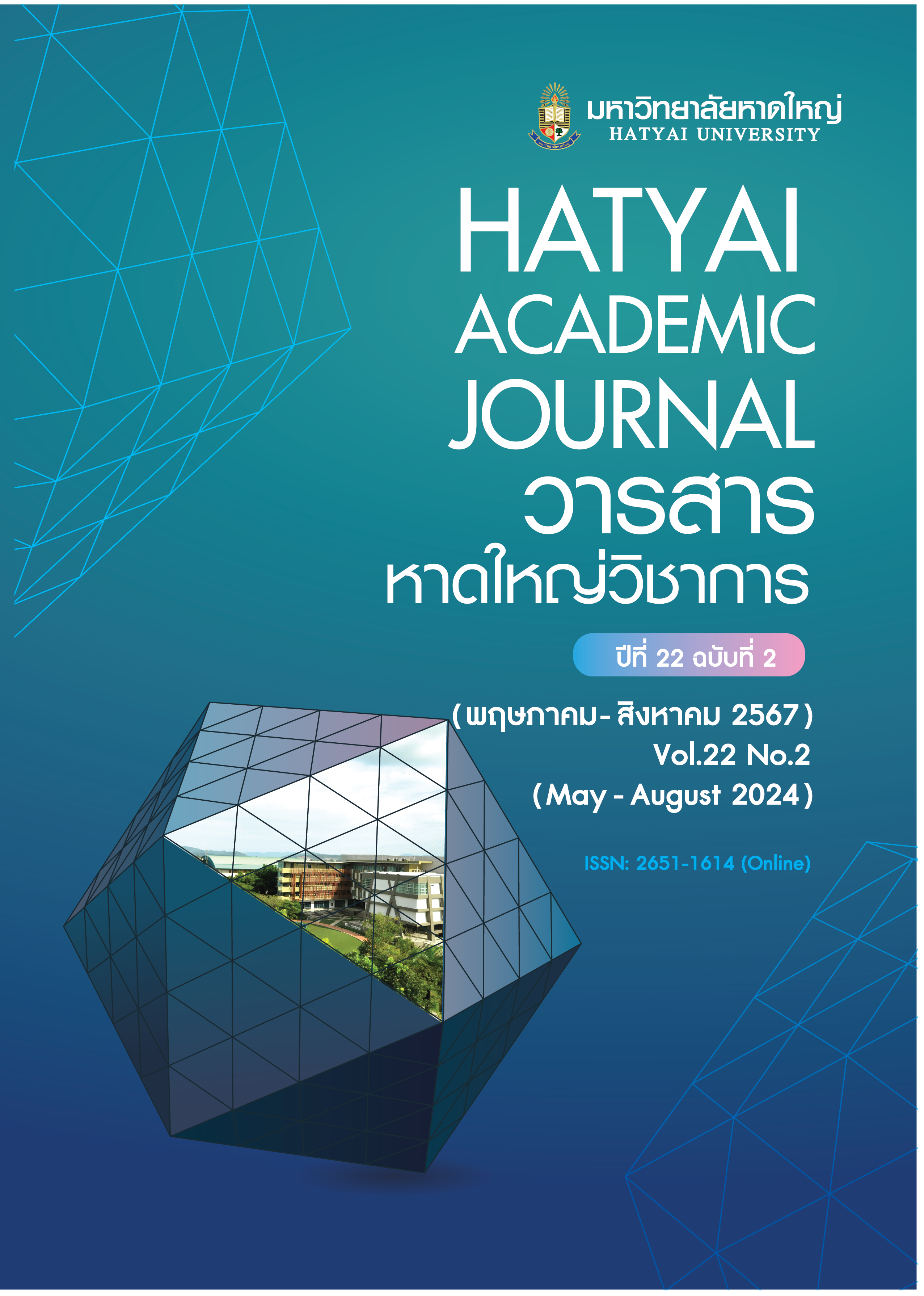Peacebuilding Strategies for Multicultural Society in the Literature of Islamic Supplementary Lessons Named “Learning for Understanding”
Main Article Content
Abstract
This research aimed to study the peacebuilding strategies in terms of lesson content and language used in the literature of Islamic supplementary lessons named “Learning for Understanding”. The resources of this research included six books of the literature of Islamic supplementary lessons named "Learning for Understanding" and one book of reprint edition, totaling at seven books. The primary data collecting and analysis had been conducted as a research method and objectives. The result showed that the writers had used five strategies in lesson content for peacebuilding. It presented the core of peace in Islam comprising with 1) the peace free from denying and deceiving; 2) the peace free from all vices and sins; 3) the peace free from Sharia and all kinds of unusual behaviors; 4) the peace free from injustice and violation; and 5) the peace free from torture in hell and vicious habitat in the underworld. In terms of language, there are four strategies used in these sample groups, namely, Referential form, Describing form, Modality form, and Arab transliteration form. This result also reflected various and interesting ways to perform the peacebuilding strategies. The readers could understand the core of the Islamic religion and Islam people’s thinking easily and significantly.
Article Details

This work is licensed under a Creative Commons Attribution-NonCommercial-NoDerivatives 4.0 International License.
All published articles are evaluated by three qualified peer reviewers from various institutions through a double-blind process, where reviewers do not know the authors’ identities and authors do not know the reviewers’ identities. The content and articles in the Hatyai Academic Journal reflect the authors’ views only and are neither the opinions of the editorial board nor the responsibility of Hatyai University. The Editorial Board of the Hatyai Academic Journal allows articles to be reproduced for academic purposes, on the condition that the original source is clearly cited.
References
Bascom, W. (1965). Four function of folklore. The Journal of American Folklore, 67(266), 333-349.
Blum, L. A. (1992). Antiracism, multiculturalism, and interracial Community: Three educational values for a multicultural Society. Boston: Office of Graduate Studies and Research, University of Massachusetts.
Charles, F. (1979). Ethnic adaptation and identity: The Karen on the Thai frontier with Burma. Philadelphia: Institute for the Study of Human Issues.
Charoenrad. W. (2020a). Research in Thai language. Nonthaburi: Nation High 1954. [in Thai]
Charoenrad. W. (2020b). The names of mosque in Bangkok: Language and interpretation of cultures (Research report). Bangkok: Dhonburi Rajabhat University. [in Thai]
Chinnun, P. (2013). Literature teachings in the South. "Small edition" (Doctoral dissertation). Chulalongkorn University, Bangkok. [in Thai]
Choksunis, T. (2008). Practical speech. Bangkok: Faculty of Arts Chulalongkorn University. [in Thai]
Hongladarom, K., & Choksunis, T. (2008). Practical speech. Bangkok: Faculty of Arts Chulalongkorn University. [in Thai]
Japakiya, L. (2004). Islam: The religion of peace. Kuala Lumpur: Fajar Ulung Sdn.
John, R. (1996). Ethnic minorities in the modern nation state. Macmillan: Basingstoke.
Khottung, S. (2001) A comparative study of literary doctrines on the poem lung teaches grandchildren rhetoric in the South and grandfather teaches grandchildren rhetoric in the Northeast (Master's thesis). Ramkhamhaeng University, Bangkok. [in Thai]
Office of the Basic Education Commission. (2012a). Islam, the religion of peace. Bangkok: Office of the Committee for Promotion of the Benefits and Welfare of Teachers and Educational Personnel Printing House Ladprao. [in Thai]
Office of the Basic Education Commission. (2012b). Hijab Islamic dress. Bangkok: Office of the Committee for Promotion of the Benefits and Welfare of Teachers and Educational Personnel Printing House Ladprao. [in Thai]
Office of the Basic Education Commission. (2012c). Halal and haram. Bangkok: Office of the Committee for Promotion of the Benefits and Welfare of Teachers and Educational Personnel Printing House Ladprao. [in Thai]
Office of the Basic Education Commission. (2012d). Why Muslims don't eat pork. Bangkok: Office of the Committee for Promotion of the Benefits and Welfare of Teachers and Educational Personnel Printing House Ladprao. [in Thai]
Office of the Basic Education Commission. (2012e). Ramadan this month that I have been waiting for. Bangkok: Office of the Committee for Promotion of the Benefits and Welfare of Teachers and Educational Personnel Printing House Ladprao. [in Thai]
Ogburn, W. F. (1946). The social effects of aviation. New York: Houghton Mifflin.
Phakawaphan, N. (2015). Invites discussion of nations and ethnicities. Bangkok: Siam Publishing House. [in Thai]
Phothirangsiyakorn, N. (2020). The end of conflict: A guide to conciliation for local leaders. Bangkok: King Prajadhipok's Institute. [in Thai]
Powell, T. B. (2003). All colors flow into rainbows and nooses: The struggle to define academic multiculturalism. Cultural Critique, 55, 152–181.
Said, J. (2001). Prophetic method of social change. Journal of Law & Religion, 15, 83-150.
Satha-Anan, C. (2008). Violence and the manipulation of “truth”: Pattani in the semi-finals century. Bangkok: Thammasat University Press. [in Thai]
Uamcharoen, P. (2009). An analytical study of Lanna literature on world and dharma cases (Master's thesis). Silpakorn University, Bangkok. [in Thai]
Usman, S. (2004). The Islamic way of peace. Bangkok: Islamic Academy. [in Thai]


